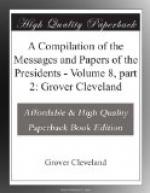John Quincy Adams.
Washington,
February 1, 1826
To the Senate of the United States:
In compliance with a resolution of the Senate of the 50th ultimo, I communicate herewith, in confidence, a report[004] from the Secretary of State, with the documents, containing the information desired by the resolution.
John Quincy Adams.
Washington,
February 7, 1826.
To the Senate of the United States:
In compliance with a resolution of the Senate of the 15th of December last, I communicate herewith reports from the Secretaries of the Treasury and War and from the Commissioner of the General Land Office, with documents, relating to the lead mines and salt springs, containing the information desired by the resolution.
John Quincy Adams.
Washington,
February 14, 1826
To the House of Representatives of the United States:
In compliance with a resolution of the House of Representatives of the 12th ultimo, I transmit herewith a report from the Secretary of the Navy, with the statements relating to naval courts of inquiry and courts-martial since the 1st January, 1824, requested by the resolution.
John Quincy Adams.
Washington,
February 15, 1826
To the House of Representatives of the United States:
I transmit to the House of Representatives a report from the late Secretary of War to the late President of the United States, with documents, containing information requested by a resolution of the House of April 10, 1824, relating to the purchases of real estate in behalf of the United States within the territorial limits of any State since the 4th July, 1776.
These papers were prepared during the last session of Congress, but by some accident were not then communicated to the House.
John Quincy Adams.
Washington,
February 16, 1826
To the Senate of the United States:
In answer to the two resolutions of the Senate of the 15th instant, marked executive, and which I have received, I state respectfully that all the communications from me to the Senate relating to the congress at Panama have been made, like all other communications upon executive business, in confidence and most of them in compliance with a resolution of the Senate requesting them confidentially. Believing that the established usage of free confidential communication between the Executive and the Senate ought for the public interest to be preserved unimpaired, I deem it my indispensable duty to leave to the Senate itself the decision of a question involving a departure hitherto, so far as I am informed, without example from that usage, and upon the motives for which, not being informed of them, I do not feel myself competent to decide.
John Quincy Adams.




